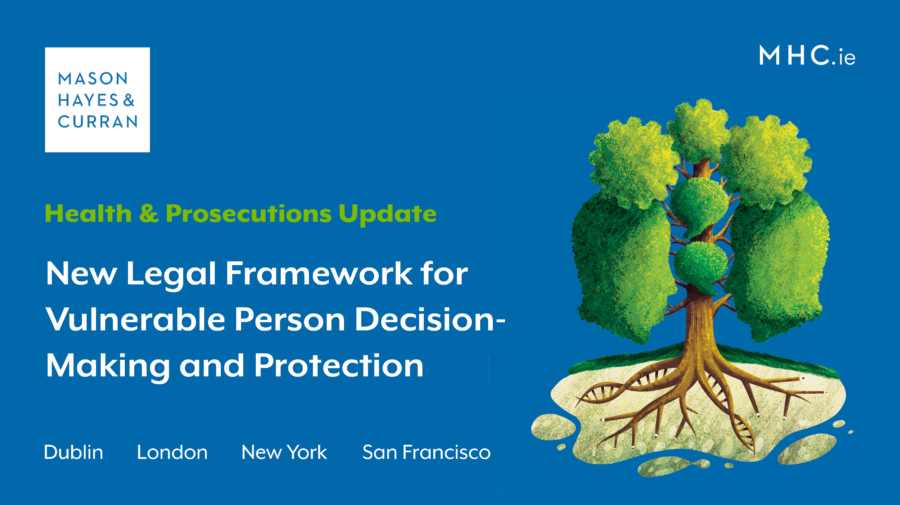New Legal Framework for Vulnerable Person Decision Making and Protection

Ireland’s new legal framework for assisted decision-making and protection of vulnerable persons is finally here. However, over 60% of the public are not aware of the changes, which the new framework introduces. Our Health & Prosecutions team summarises what individuals, families and professionals need to know.
The Assisted Decision-Making (Capacity) Act became law on 26 April 2023.
We examine the complexity of decision-making, consent and state protection for adults who are vulnerable by virtue of a disability, mental health or illness. We also look at some of the key issues arising for public bodies in capacity applications.
Research conducted by Safeguarding Ireland in May 2023 showed that research indicated more than 60% of people did not know about the new Assisted Decision-Making Act. We are five months into the new regime but there is still confusion about the legislation. Its purpose is to help vulnerable persons.
Summary of the changes
The changes introduced by the Assisted Decision-Making Act are significant and span across a number of key areas and themes:
Adult wardship
Adult wardship, which was managed through the High Court and the Wards of Court Office, will gradually be phased out. All existing wards will be released from wardship and will become known as “former wards”. This will be completed via a three-step process of capacity review, declaration and Order. Discharge applications can be made by the Ward, their Committee or solicitor.
Capacity review and declaration
Once a capacity review of a vulnerable person takes place, the Court will make a declaration as to the capacity of the person. It can make one of three declarations including that the person:
- Does not lack capacity
- Lacks capacity unless a Co-Decision Maker is appointed, or
- Lacks capacity even if a Co-Decision Maker is appointed
Decision supporters
Depending on the vulnerable person’s level of capacity, a three-tier framework of decision supporters overseen by the Decision Support Service (DSS) can be used. The tiers of decision supporter are:
- Decision-Making Assistant
- Co-Decision Maker
- Decision-Making Representative
Record of agreement
In many cases, the Assisted Decision-Making Act will be used without the case ever coming before a court. Instead, an agreement will be registered with the DSS.
This service will support families and individuals while also keeping a register of agreements between family members / trusted persons and the vulnerable person. The register can be inspected by banks, solicitors, doctors, and other professionals. They can check the status and make complaints to the support service if there are any concerns regarding coercion or undue influence on decision-making.
Appointment of a decision-making representative
Court applications under the Assisted Decision-Making Act only arise where a Decision-Making Representative is required, This may due to the fact that the person concerned no longer has the capacity to make their own decisions or share decision-making with a family member or trusted person. In these cases, the representative appointed by the Circuit Court could be a family member, This family member will take over decision-making under the supervision of the Court, or an independent person if a family member is unwilling or unsuitable to act. This person will also be supervised by the Court and the DSS. For example, if a person has a stroke, their spouse can be appointed as a decision-making representative via a Court order, if appropriate.
Urgent medical intervention
It is important to note that the new decision-making legislation applies to the vulnerable person’s personal welfare and/or their property and affairs, ie nursing home care and day-to-day decision-making. If urgent medical intervention or life-saving treatment is required, directions of the High Court may be given under the jurisdiction of the High Court. An example of this is where lifesaving surgery is administered to a person who lacks the capacity to consent to treatment.
Future decisions
The new legislation also allows for future planning if a person becomes incapacitated and cannot make decisions. This includes future healthcare options and financial planning.
Other changes for practitioners to be aware of
Alongside the new Assisted Decision-Making legislation, practitioners should be aware of the other parts of the legal framework for vulnerable persons, which include:
- National Vetting Bureau (Children and Vulnerable Persons) 2012 – this places legal obligations on organisations that provide a service to vulnerable persons to follow clear vetting processes. There is also a requirement for organisations to consider reporting the outcome of a disciplinary matter, which would give rise to a risk for that person working with vulnerable persons in the future. This could include a scenario where a nurse is struck off the register for abusive behaviour, but may try to work as a social care leader. This “soft” information would show up on vetting.
- Criminal Justice Act (Reporting of Crimes Against Children and Vulnerable Persons) 2012 – this requires persons to report crimes against vulnerable persons to the gardai. This would be in addition to the requirement to report under the current safeguarding guidelines
- Mental Health Act 2001 - the Mental Health Act applies in the detention of adults in approved centres where there is evidence of mental disorder.
The Decision Support Service can provide guidance for most initial queries. However, there are some cases which will require specialised legal advice, especially where there is no family member to assist the person.
Listen to our related podcast from authors Sonya Bruen and Katie Bermingham-Thomas.
For more information and expert advice, contact a member of our Health & Prosecutions team.
The content of this article is provided for information purposes only and does not constitute legal or other advice.
Share this:




